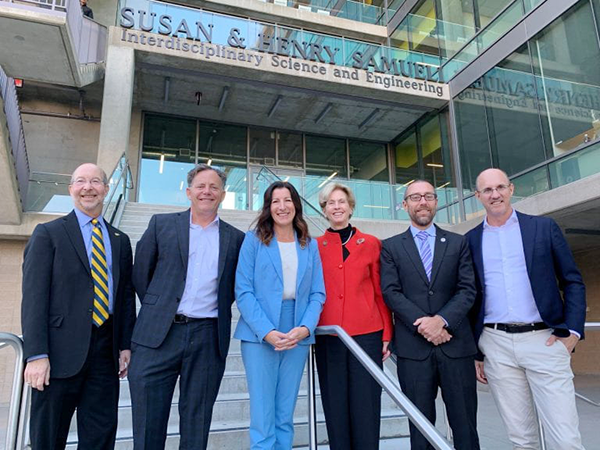Meeting on UCI Campus Addressed Coastal Problems and Solutions
Elected officials, community leaders, deans and faculty experts were in attendance

Dignitaries in attendance at a coastal solutions meeting held at UCI on Dec. 21 included, from left to right, John Gould, dean of UCI’s School of Social Ecology; Senator Josh Newman of California’s 29th Senate District; Assemblywoman Cottie Petrie-Norris of the 73rd Assembly District; Assemblywoman Diane Dixon of the 72nd Assembly District; Dean of Engineering Magnus Egerstedt; and Brett Sanders, UCI professor of civil and environmental engineering. Brian Bell / UCI
Dec. 24, 2022 - Climate change-driven threats to Orange County’s coastline were the main topic of discussion at a meeting held on December 21 in the Susan and Henry Samueli Interdisciplinary Science and Engineering Building on the UCI campus. Convened by California Assemblywoman Cottie Petrie-Norris, the gathering provided a picture of the evolution – and in many cases, degradation – of Southern California’s beaches in recent decades.
“Our beaches are highly visible environmental climate indicators, but they also are economic engines of this part of the world, and they’re part of our cultural heritage,” said opening speaker Magnus Egerstedt, dean of The Henry Samueli School of Engineering. “Taking care of our beaches is a win-win for California; it’s extraordinarily important that we get this right.”
Egerstedt said that UCI was strategically well-positioned to take on this challenge because of the university’s strong interdisciplinary approach to problem solving.
“We have outstanding scientists conducting fundamental research, and we also have outstanding engineers that build solutions on this basic science, then we have excellent, public policy and social science researchers,” he said. “At UCI, ideas go all the way from basic research, to engineering solutions, to public policy, which means that we can do things that actually matter.”
A significant portion of the meeting’s allotted time was devoted to the presentation of physical processes and new satellite data which explain why some Orange County beaches are particularly hard-hit — areas like San Clemente in southern Orange County — and some are not.
Brett Sanders, UCI professor of civil and environmental engineering, introduced a vision for a digital platform to anticipate erosion hot spots before disaster strikes, and for providing communities with the crucial understanding of local sand dynamics that they need to plan effective solutions.
New satellite remote sensing technologies that have become available in recent years enable researchers to measure the width of beaches along shores on a biweekly basis and in increments of a few yards, providing a high-resolution data resource of shoreline conditions around the world. And with a grant from NASA, Sanders is also working to develop satellite-based technologies that not only measure beach width but also measure sand volume on the beach.
Sanders stressed that technology is only part of the solution. Equally important is using the tools to help inform policy decisions with a basis in practicality and fairness.
“A digital platform that brings the best available science and data on beach dynamics to communities across California will position communities to quickly take actions that are going to be timely and effective,” he said. “The platform will also allow be designed for participation, so as communities respond to coastal erosion, they can do so in an inclusive way that leads to results which are equitable and effective.”
Katharine Mach, professor at the University of Miami and frequent collaborator with Sanders and other UCI researchers, shared her knowledge of the impact of climate-driven flooding and beach erosion in South Florida and discussed ways of overcoming barriers to participation affecting various members of communities.
Riley Pratt, Ph.D., representing California State Parks, discussed the challenges and opportunities of coastal adaptation projects on Orange County’s beaches. Nicola Ulibarri, UCI professor or urban planning and public policy, talked about some of the thorny issues around navigating the regulatory environment.
Charles Lester, director of the Ocean and Coastal Policy Center in the Marine Science Institute at UC Santa Barbara and former executive director of the California Coastal Commission, said the Golden State’s beach loss problem presented an opportunity for integration and multidisciplinary research and spoke about ways that solutions can be scaled up beyond Orange County to encompass the entire California coastline.
At the end of the meeting, John Gould, dean of UCI’s School of Social Ecology, led a question and answer session to tie together all of the information provided in the presentations.
Referring to California’s “840 miles of breathtaking beauty” which is both a home to 70 percent of Californians and vital to the state’s economy, Assemblywoman Petrie-Norris said that stakes of the day’s conversation could not have been higher.
“I think what’s exciting is that we have got some of the world’s leading researchers, leading public policy experts operating right here in UCI,” she said. “In the same way that solving this takes a multidisciplinary approach, it also takes a whole-of-government approach. These are hard problems. There are no easy answers. We need to bring government leaders from every level, from local, state, federal, around the table to engage in these conversations, help forge the solutions and help meet these challenges.”
About UCI’s Brilliant Future campaign: Publicly launched on Oct. 4, 2019, the Brilliant Future campaignaims to raise awareness and support for UCI. By engaging 75,000 alumni and garnering $2 billion in philanthropic investment, UCI seeks to reach new heights of excellence in student success, health and wellness, research and more. The Henry Samueli School of Engineering and School of Social Ecology play a vital role in the success of the campaign. Learn more by visiting https://brilliantfuture.uci.edu/the-henry-samueli-school-of-engineering/ and https://brilliantfuture.uci.edu/uci-school-of-social-ecology/.
– Brian Bell / UCI
